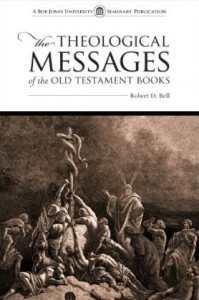Review: The Theological Messages of the Old Testament Books
 Dr. Robert Bell’s book The Theological Messages of the Old Testament Books contains a wealth of information and serves as a useful resource for Bible students at both the intermediate and advanced levels. The book begins with an introduction to the discipline of biblical theology and an explanation of the book theology method utilized in the content chapters. Following this introduction, Bell presents the theological messages of the Old Testament books in thirty-three chapters (combining Judges & Ruth; 1 & 2 Samuel; 1 & 2 Kings; 1 & 2 Chronicles; and Obadiah, Joel, & Zephaniah). The book concludes with four appendices (bibliography of book theologies, sermon on a theological theme, sermon on a book theology, and a chart of each book’s theme) and an author index.
Dr. Robert Bell’s book The Theological Messages of the Old Testament Books contains a wealth of information and serves as a useful resource for Bible students at both the intermediate and advanced levels. The book begins with an introduction to the discipline of biblical theology and an explanation of the book theology method utilized in the content chapters. Following this introduction, Bell presents the theological messages of the Old Testament books in thirty-three chapters (combining Judges & Ruth; 1 & 2 Samuel; 1 & 2 Kings; 1 & 2 Chronicles; and Obadiah, Joel, & Zephaniah). The book concludes with four appendices (bibliography of book theologies, sermon on a theological theme, sermon on a book theology, and a chart of each book’s theme) and an author index.How Christ was “made perfect”
Christ is perfect: he always has and always will be perfect. Yet, the author of Hebrews says that Christ become the cause of our eternal salvation by “being made perfect” (τελειωθεὶς). How are we to interpret this difficult phrase?
What I Was Doing Last Semester
During my recent blog hiatus, I was not doing several things. I was not vacationing; I was not sleeping all day; I was not climbing Mount Everest.
Instant Gratification
Instant Gratification – a real temptation
Hundreds of advertising messages bombard the average American each day. The pressure to buy (and buy now!) is practically unavoidable. Manufacturers spend billions each year to convince us that we need their newest and greatest products; they want us to believe that our lives will be incomplete until we buy what they are selling. Marketing pushes us to pursue instant gratification.
Searching for the perfect font
I’m on a search for the ideal theological font. That font will have several characteristics:
A Post-Patriotic Thought or Two…
Is it just me, or is the Fourth of July one of the hardest holidays for Christians to figure out? Sure, Halloween is controversial, Santa might be an anagram for Satan, and Cadbury Eggs seem to be the only legitimate reason to posit the existence of an Easter Bunny, but none of those issues affect corporate worship. Check out the Christian social media sphere around July 4, and you’ll find scores of articles, statuses (stati?), and tweets expressing opinions about patriotism and Christianity. You’ll find everything from “America is God’s chosen country so let’s quote OT verses about Israel as if they applied to the USA” to “patriotism is flat-out idolatry and has no place in church at all.” Here are a few thoughts about patriotism and Christianity that I mulled over last weekend.
Does reading the Bible “in context” limit application?
No, it really doesn’t. But that’s a criticism that comes up occasionally. If you challenge a slightly careless or assumptive interpretation by pointing out what the verse specifically means in context, you’ll find that some people will defend the poor interpretation based on their belief that it needs to apply to something (usually outside the boundaries of the context). Phrases like “the appearance of evil,” “the day the Lord has made,” “the nation whose God is the Lord,” “stumbling-blocks,” “a new song,” “owe no man any thing,” and numerous others find themselves often abused by over-broad interpretation. Are we losing something valuable if we limit those words to what they actually mean in context?
Associations (and why they might not be as important as you’ve been told)
If there were one word I could expunge from Fundamentalism’s vocabulary, it would be the word “association.” Actually, that might not be at the head of the list, but it would definitely make the top ten. “Association” frequently serves as a smoke screen to cover unnecessary and unbiblical separation. For the sake of “guarding associations,” Scripturally mandated unity finds itself discarded as the body of Christ suffers great mutilation. If we are going to demonstrate God’s glory through the Church, we need to make admissions and change our thinking about associations.
Eternal worship starts today!
“Blessed be the name of the LORD from this time forth and for evermore. From the rising of the sun unto the going down of the same the LORD’s name is to be praised.” ~ Psalm 113:2-3
C. S. Lewis: Read old books!
While preaching about the early church fathers’ understanding of the Gospel recently, Ligon Duncan opened his message with a lengthy quotation from C. S. Lewis’ introduction to Athanasius’ On the Incarnation. I realize this is a lengthy quotation, but I found it very challenging: it certainly motivates me to spend more time with older sources, it gives a broader perspective to the mental blinders that every generation wears by default, and encourages the humble teachability that theological studies require. I’m sure you’ll find it profitable as well!